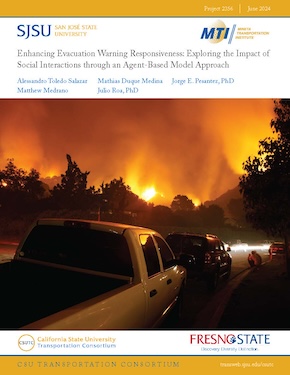- 408-924-7560
- mineta-institute@sjsu.edu
- Donate
Enhancing Evacuation Warning Responsiveness: Exploring the Impact of Social Interactions through an Agent-Based Model Approach
Evacuations are the preferred response to human- or natural-caused disasters. The process often involves people deciding when and how to evacuate based on messages from local authorities. However, diverse opinions of the affected people may influence their decision to evacuate or to stay and see how the situation unfolds. This project applies an opinion dynamics concept to model the opinion and decision-making of people threatened by wildfire. To demonstrate how individual opinions evolve with time, the model applies an agent-based approach that includes the interaction between an agency sending an evacuation message and the affected population. There are three sources of information concerning the mathematical model of an opinion: the global broadcasting message, interaction of the agent with its social media network, and observations of neighbors’ actions. The opinion value of each agent leads to a decision to evacuate if it overcomes a resistance threshold. By combining sources of information, the results show that when global broadcasting is the only information available to agents, a decision to evacuate is unanimously reached after a short period. However, when social media interactions are included, there is a delay in reaching a unanimous agreement to evacuate. Furthermore, when social media interactions are replaced by observing the actions of neighbors, there is no agreement to evacuate among the agents, and most of them decide to stay and see how the situation progresses. This research project provides opportunities for planning and management of traffic and routes when an evacuation is expected but the number of people participating is unknown. The results provide valuable insights that could be applied as part of disaster-planning and other potentially life-saving measures.
ALESSANDRO TOLEDO
Alessandro Toledo is a Civil Engineering undergraduate student at California State University, Fresno. He has participated in multiple research projects around civil infrastructure, optimization, modeling, and data analysis. Under the guidance of Dr. Jorge Pesantez, he worked on the agent-based model to simulate the opinion dynamics of a population threatened by a wildfire event.
MATTHEW MEDRAN
Matthew is a third-year undergraduate student at Fresno State University, majoring in Civil Engineering. He is a member of Fresno State's Lyles College of Engineering Honors Program and is involved in the ASCE student chapter. Matthew has an interest in transportation as well as modeling research and plans to attend graduate school in order to gain more knowledge about the engineering industry.
MATHIAS DUQUE
Mathias is an international student from Ecuador who arrived at Fresno State in 2021 to pursue his bachelor’s degree in civil engineering. He has previously assisted in the instruction of STEM classes and currently contributes to the Fresno State Transportation Institute.
JULIO ROA, PHD
Dr. Roa (Co-PI) currently serves as an Assistant Professor at California State University Fresno, a role he embraced in 2018. His academic journey is rooted in Virginia Tech. where he not only served as an instructor but also completed his advanced degrees in civil engineering. He earned his master's degree in 2008, focusing on Transportation Infrastructure, and later, his doctoral degree in 2018, specializing in Transportation Systems.
JORGE PESANTEZ, PHD
Dr. Pesantez (PI) led this project on the implementation of an Agent-based model using Opinion Dynamics theory. Dr. Pesantez has extensive work in simulation models for infrastructure analysis. Current research areas are water demand modeling, water resources engineering, and water conservation strategies.
-
Contact Us
San José State University One Washington Square, San Jose, CA 95192 Phone: 408-924-7560 Email: mineta-institute@sjsu.edu






